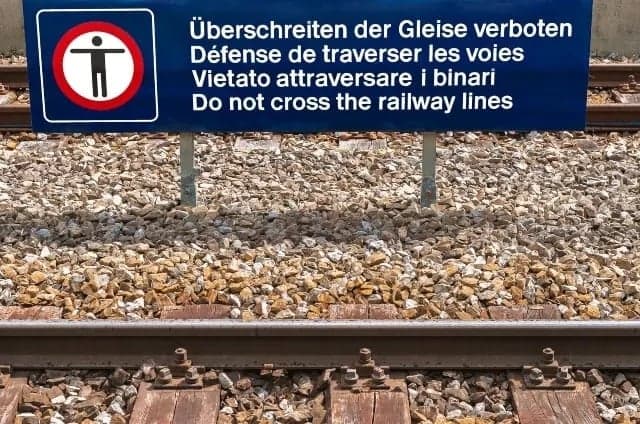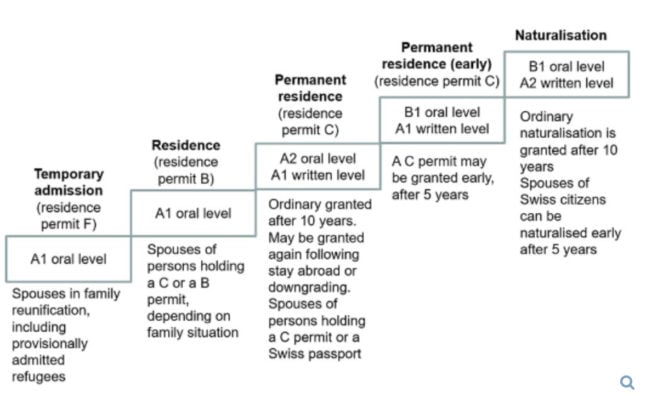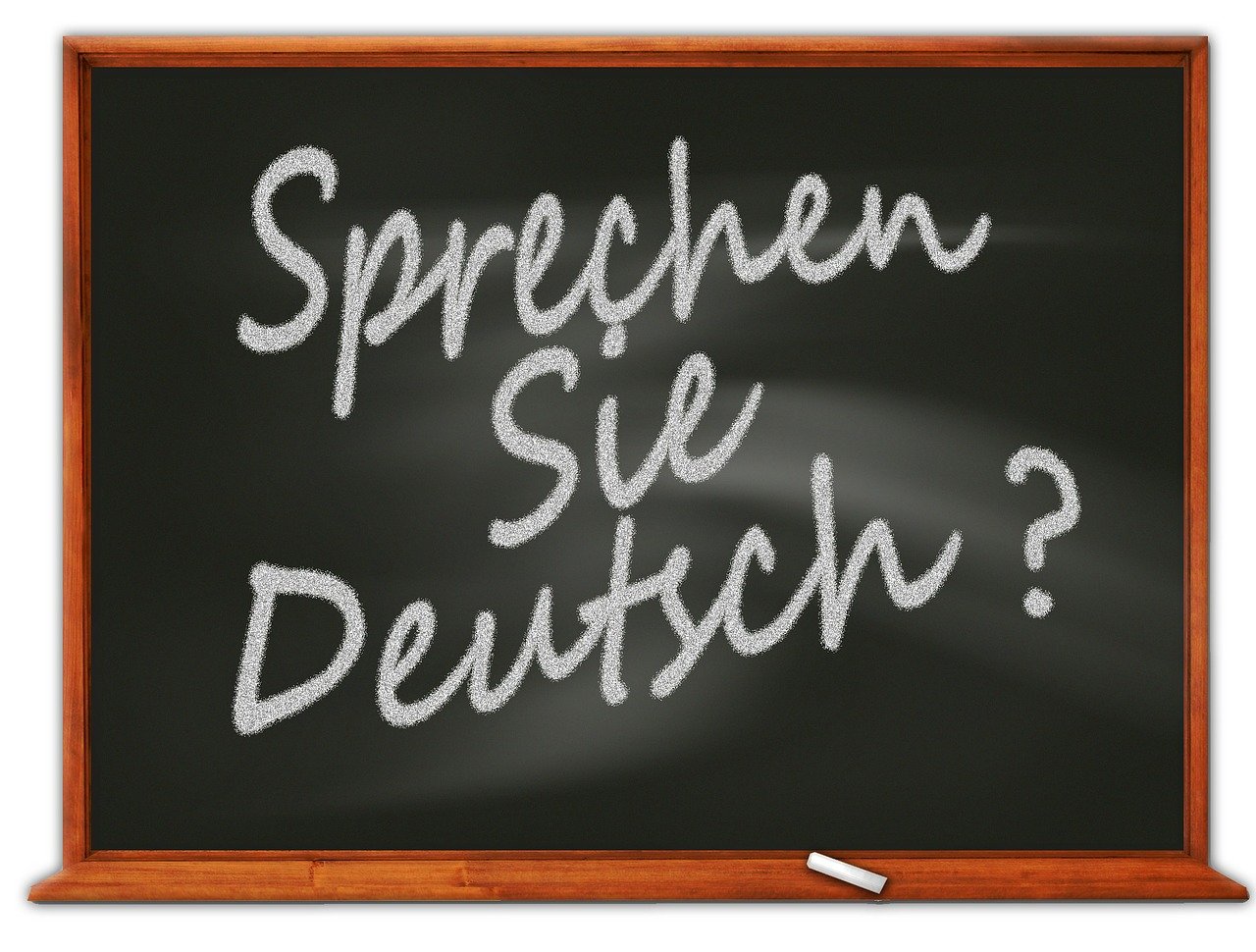What language tests for permits and citizenship does Switzerland impose?

Proficiency in a national language is one of the main requirements for foreigners applying for either a work permit or Swiss passport. Exactly how fluent do you need to be for each?
A requirement to know a local language is not specific to Switzerland — many other countries have such a rule as well.
What is different (and more complicated) in Switzerland is that there are four national languages — German, French, Italian and Romansh.
READ ALSO: How did Switzerland become a country with four languages?
Fortunately, you only need to be proficient in one of these languages to obtain a permit or citizenship.
Obviously, people who come from France, Italy, Germany, or Austria have a huge advantage over those from other countries, as they don’t have to prove their proficiency the way other foreigners must.
If you are not one of those native speakers, what proficiency levels must you have to be able to obtain a work permit or apply for naturalisation?
This is determined by the State Secretariat for Migration (SEM) which has based its requirements on the Common European Framework of Reference (CEFR), a definition of different language levels written by the Council of Europe.
The required level, according to SEM, "differentiates between oral and written language proficiency," with the requirement for spoken proficiency higher than for written one.
This is because oral communication is considered more important for the integration into working and social life.
Be aware, however, that SEM’s levels are a minimum requirement, and some cantons might have stricter criteria.
This SEM chart indicates language proficiency on the federal level for both permits and citizenship, for different population groups.

Which national language do you have to speak?
Let’s say you are a German citizen who is settling in the French-speaking region. Do you still have to pass a French language exam to get a work permit or citizenship, or is being fluent in one national language sufficient?
As the tests are done at a communal level, the language in the commune where you live is the one you need to speak.
Therefore, if you have flawless in German but live in Vaud, you need to improve your French in order to make sure you pass the test.
What about the bilingual cantons and cities?
A number of Swiss cantons have two official languages. These are Bern (German and French), Fribourg (German and French), Valais (French and German) and Graubünden (German, Romansh and Italian).
There are also two bilingual German and French cities: Biel/Bienne and Fribourg.
A Swiss Federal Supreme Court case from 2022 held that a person is required to demonstrate language proficiency in the administrative language of the municipality in which they apply, even if they are a native speaker of a different Swiss language.
In that case, a Cameroonian who arrived in Switzerland at the age of eight with French as her native tongue was required to demonstrate proficiency in German in order to be successfully naturalised in the German-speaking commune of Thun.
 Or French, Italian or Romansh. Image by Gerd Altmann from Pixabay
Or French, Italian or Romansh. Image by Gerd Altmann from Pixabay
If you live in a German-speaking canton, do you have to be proficient in Swiss-German?
If you happen to speak Schwyzerdütsch (Swiss German) and especially the local dialect, you will no doubt impress your naturalisation committee (unless it in the French or Italian-speaking part, in which case you needn’t even try).
However, as the exam is based on the European (CEFR) standard, and Swiss-German isn’t a part of that, you will be judged on the knowledge of ‘regular’ German only.
READ ALSO: Swiss German vs Hochdeutsch: What are the key differences?
What about Romansh?
It is an official Swiss language as well, even though only about 60,000 people in canton Graubünden still speak it.
However, since 2021, Romansh speakers are allowed to take the citizenship exam in their native language. As SEM explains on its website, “people who live in Romansh-speaking municipalities in Graubünden will now be able to produce a language certificate in Romansh… exams can be taken in Sursilvan, Sutsilvan, Surmiran, Puter and Vallader – the five Romansh languages – as well as Rumantsch Grischun.”
As Romansh is not part of CERF, it’s proficiency will be judged by native speakers.
SEM doesn’t specify whether it is sufficient for citizenship purposes to know only Romansh and not the canton’s other official language, German, or even Italian, which is spoken in some parts of the canton.
It is difficult to imagine, though, given that Romansh is only spoken in some mountain communities, how a Romansh-only speaker would communicate in other parts of the canton or, indeed elsewhere in Switzerland, but law is law.
Comments
See Also
A requirement to know a local language is not specific to Switzerland — many other countries have such a rule as well.
What is different (and more complicated) in Switzerland is that there are four national languages — German, French, Italian and Romansh.
READ ALSO: How did Switzerland become a country with four languages?
Fortunately, you only need to be proficient in one of these languages to obtain a permit or citizenship.
Obviously, people who come from France, Italy, Germany, or Austria have a huge advantage over those from other countries, as they don’t have to prove their proficiency the way other foreigners must.
If you are not one of those native speakers, what proficiency levels must you have to be able to obtain a work permit or apply for naturalisation?
This is determined by the State Secretariat for Migration (SEM) which has based its requirements on the Common European Framework of Reference (CEFR), a definition of different language levels written by the Council of Europe.
The required level, according to SEM, "differentiates between oral and written language proficiency," with the requirement for spoken proficiency higher than for written one.
This is because oral communication is considered more important for the integration into working and social life.
Be aware, however, that SEM’s levels are a minimum requirement, and some cantons might have stricter criteria.
This SEM chart indicates language proficiency on the federal level for both permits and citizenship, for different population groups.

Which national language do you have to speak?
Let’s say you are a German citizen who is settling in the French-speaking region. Do you still have to pass a French language exam to get a work permit or citizenship, or is being fluent in one national language sufficient?
As the tests are done at a communal level, the language in the commune where you live is the one you need to speak.
Therefore, if you have flawless in German but live in Vaud, you need to improve your French in order to make sure you pass the test.
What about the bilingual cantons and cities?
A number of Swiss cantons have two official languages. These are Bern (German and French), Fribourg (German and French), Valais (French and German) and Graubünden (German, Romansh and Italian).
There are also two bilingual German and French cities: Biel/Bienne and Fribourg.
A Swiss Federal Supreme Court case from 2022 held that a person is required to demonstrate language proficiency in the administrative language of the municipality in which they apply, even if they are a native speaker of a different Swiss language.
In that case, a Cameroonian who arrived in Switzerland at the age of eight with French as her native tongue was required to demonstrate proficiency in German in order to be successfully naturalised in the German-speaking commune of Thun.

If you live in a German-speaking canton, do you have to be proficient in Swiss-German?
If you happen to speak Schwyzerdütsch (Swiss German) and especially the local dialect, you will no doubt impress your naturalisation committee (unless it in the French or Italian-speaking part, in which case you needn’t even try).
However, as the exam is based on the European (CEFR) standard, and Swiss-German isn’t a part of that, you will be judged on the knowledge of ‘regular’ German only.
READ ALSO: Swiss German vs Hochdeutsch: What are the key differences?
What about Romansh?
It is an official Swiss language as well, even though only about 60,000 people in canton Graubünden still speak it.
However, since 2021, Romansh speakers are allowed to take the citizenship exam in their native language. As SEM explains on its website, “people who live in Romansh-speaking municipalities in Graubünden will now be able to produce a language certificate in Romansh… exams can be taken in Sursilvan, Sutsilvan, Surmiran, Puter and Vallader – the five Romansh languages – as well as Rumantsch Grischun.”
As Romansh is not part of CERF, it’s proficiency will be judged by native speakers.
SEM doesn’t specify whether it is sufficient for citizenship purposes to know only Romansh and not the canton’s other official language, German, or even Italian, which is spoken in some parts of the canton.
It is difficult to imagine, though, given that Romansh is only spoken in some mountain communities, how a Romansh-only speaker would communicate in other parts of the canton or, indeed elsewhere in Switzerland, but law is law.
Join the conversation in our comments section below. Share your own views and experience and if you have a question or suggestion for our journalists then email us at [email protected].
Please keep comments civil, constructive and on topic – and make sure to read our terms of use before getting involved.
Please log in here to leave a comment.